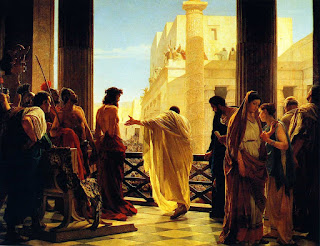THE MYSTERY OF CHRIST II
Apostle Paul, writing to the Ephesians, said, "in reading this, then, you will be able to understand my insight into the mystery of Christ" (Ephesians 3:4). The relevance of Paul's remark lies in the fact that, at that time, there was another understanding about the Christ who was to come. The concept that dominated the thinking of Jews in general and of religious people was marked by the notion of a political-nationalistic Christ. Israel, heavily secularized during the reign period, developed this notion due, among other reasons, to Nathan's prophecy to David (1Chronicles 17:12-14). In the face of Roman rule at the time of Jesus, the expectation of the coming of this Christ was strong. This is certainly why the religious people did not identify Jesus, the carpenter from Nazareth, as the Messiah and decided to kill him.
This word "Christ" although it is deeply associated with the name Jesus, functioning practically as a last name, is, in fact, a title. "Christ" is the Greek version of the Hebrew word "Messiah", which means "anointed one". It was employed, in the Old Testament, in association with prophets, priests and kings. This tradition of the coming of an Anointed One to guide the people is ancient. Already in Moses, it is present. Moses said that the LORD would raise up a prophet like him to guide and direct them (Deuteronomy 18:15-19). Scholars understand this Mosaic word both as a reference to the lineage of prophets that would follow, and as the basis for the messianic expectation that is fully fulfilled in Jesus [1].
Regarding this misconception about the Messiah, Pohl, quoting Hengel (Zeloten, p.297-307), states, in his commentary on the Gospel of Mark, that there appeared in Israel, in those decades around the death of Jesus, six or seven Zealot messiahs. It is said that some of them considered themselves of David's descent and, therefore, “king of the Jews”. At their appearances, they gathered followers and then isolate themselves in the desert for armed campaigns against the occupying Roman forces. In fact, the evangelist Luke has recorded that Gamaliel, when advising the Sanhedrin what to do with the Apostles who kept preaching about Jesus, spoke of the appearance of Theudas and Judas, claiming to be the Christ, but that their end was death in a confrontation with the Roman troops (Acts 5:33-39).
Although the Jews expected a political-military leader to deliver them from Roman rule, the Scriptures are clear in showing that the Messiah's action would not be restricted to Israel. His mission would have cosmic implications, that is, it would have an influence on human beings and the entire universe, all of existence. Regarding mankind, the Messiah promised by God would be a spiritual leader who would come to the world to free it from the effects of original sin and restore it to its initial condition of perfection, which would allow its reunion with the Creator (Romans 8:28-34). Regarding the universe, at the right time, on the day of the Lord, all creation would be restored and brought to a state of perfection without the effects of sin (Romans 8:19-22; 2Peter3:12,13; Revelation 21 and 22).
This idea is already present, in Eden, at the moment of the Fall, that is, of original sin. According to the author of Genesis, God said to the serpent who induced man to sin: "I will put enmity between you and the woman, and between your offspring "and hers; he will crush "your head, and you will strike his heel" (3:15). About this statement, the New International Version Bible commentators say, "the antagonism between human beings and serpents is used to symbolize the outcome of the titanic struggle between God and the Evil One, a war waged in the hearts and history of human beings. The offspring of the woman would eventually crush the serpent's head, a promise fulfilled in Christ's victory over Satan - in which all believers will participate (Romans 16:20) [3].
It is clear that the Messiahship
of this coming Christ would be spiritual. The focus was not Israel, but all of
humanity that was trapped in the condition of decadence and eternal death
because of original sin. Thus, the one who comes is not a great anointed
leader, but God Himself, in human form, conceived in a virgin's womb by the
Holy Spirit, because only He could solve this problem. In this way, those who
accept Christ's call begin to live in the hope of meeting their Creator again,
which is made concrete in the Johannine vision: "...I saw new heavens and
a new earth... Look! God's dwelling place is now among the people, and he will
dwell with them. They will be his people, and God himself will be with them and
be their God. He will wipe every tear from their eyes. There will be no more
death.... He who was seated on the throne said, 'I am making everything new'
" (Revelation 21:1:5).
Antônio
Maia - M. Div.
Copyright
[1] BÍBLIA Nova Versão
Internacional. São Paulo: Ed Vida. 2003, p. 293.
[2] POHL, Adolf. Evangelho de
Marcos - Comentário Esperança. São Paulo: Ed
Evangélica Esperança, 1998, p.428
[3] BÍBLIA Nova Versão
Internacional. São Paulo: Ed Vida. 2003, p. 11.



Comments
Post a Comment